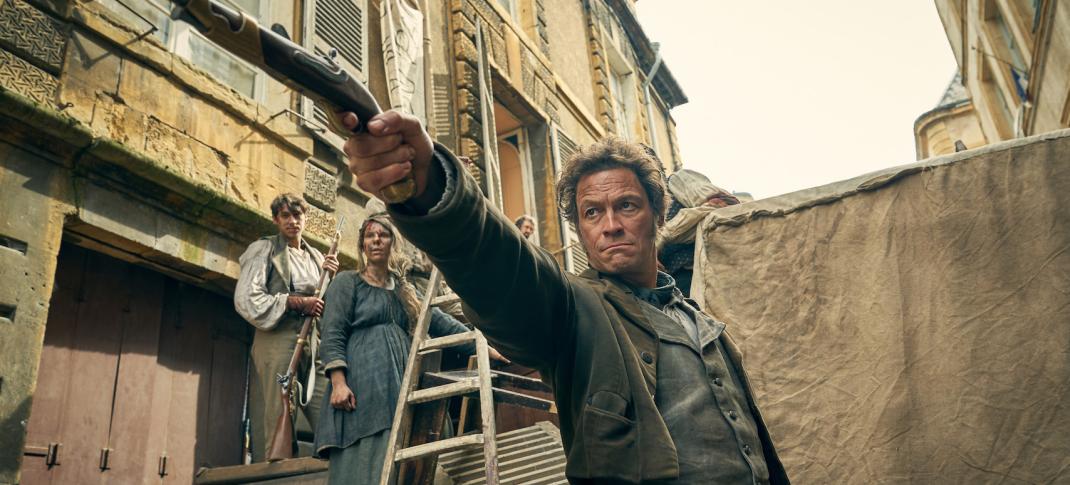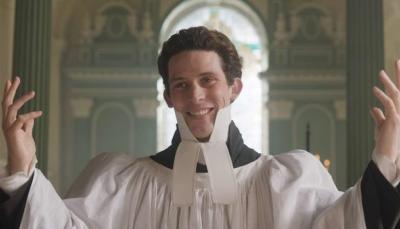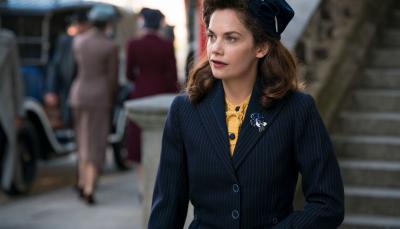'Les Miserables' Episode 6 Recap: One Day More

MASTERPIECE “Les Misérables” Sundays, April 14 - May 19, 2019 at 9pm ET on PBS Episode Six Sunday, May 19, 2019; 9-10pm ET Marius mans the barricades, where a hostile Valjean intercepts him. They end up fleeing together through the sewers of Paris. Cosette’s story reaches its conclusion. So does Javert’s. Picture Shows: Jean Valjean (DOMINIC WEST) For editorial use only. Photographer: Robert Viglasky (C) Lookout Point
Copyright: Lookout Point
Previously on Les Miserables: Javert’s obsession with Val Jean drives him toward increasingly bizarre behavior, including disguising himself as a revolutionary because he’s convinced his nemesis is, like, trying to bring down the monarchy, or something. Why? IDK, the show never bothers to explain. It also never really bothers to explain much about the pack of students building barricades in the name of the French Republic, nor does it tell us most of their names. (Though you’ll know who Enjolras is if you’ve seen the musical.) None of this super matters since they pretty much all die, and at least the final battle set piece is impressive to watch. Elsewhere, Marius and Cosette are in love, Valjean disapproves, and Thenardier is still alive and not in jail. Whew. Need more detail? Our Episode 5 recap is right this way.
Les Miserables barrels toward its dramatic conclusion with several of the story’s most highly anticipated moments – The fall of the barricades, Marius’ rescue, Valjean and Javert coming face to face again. But as the story hits several of its biggest emotional highlights, there’s kind of a problem. And that is, we’ve run out of time to explain why people are doing the things they’re doing. Maybe the series needed to be an episode or two longer, or it simply spent too much time on Fantine and Valjean’s early days, I don’t know. But, as I’ve mentioned before, it’s hard to care too much about some of these characters when you feel like you don’t know them at all.
And that’s the case as the barricades fall. Dozens die, including a bunch of “major” characters, young men whose names and lives the series’ has barely bothered to mention, using them more as a stand in for the idea of lost youth and wasted idealism. If I can’t tell you anything about these boys as people, can I really mourn them as a viewer? Sure, some of the set-piece moments are impressive – Gavroche’s meaningless death hunting bullets and the firing squad execution of Enjolras and his drunk friend whose name I still don’t know come to mind. But on the whole this is a pile of bodies largely without meaning, and other than generally being against the concept of senseless death, it’s not clear why we should have hoped for them to win.

Even Valjean’s trip to the barricades feels random, since he heads there to (maybe) kill his daughter’s boyfriend but then decides he’s, like, marriage material or something because he watched him be sad over a dead child. Valjean kicks it into overdrive after Marius is shot collecting Gavroche’s body, dragging his daughter’s boyfriend on a long, disgusting journey through the Paris sewers. On the way he decides to release Javert before the rebels can kill him, because Valjean is a deeply good person, and has spent what feels like his entire life trying to run away and turn himself in at the same time.
Valjean and unconscious Marius’ trek through the gross sewers takes entirely too long, especially given that the sequence is shot in a darkness that is so complete it’s often hard to tell what’s going on. But, once again, Dominic West’s portrayal of Valjean is at its best in moments like this, when it’s all sort of dirty and animalistic and feral again, using his strength and rage to save a life. That he also uses it to beg Javert for the life of a boy he’s never liked that much is an exceptionally well done moment, and it feels earned precisely because we’ve seen Valjean choose the good of others over his own before.
Unfortunately, we can’t really say the same for Javert, which is why his sudden decision to let Valjean go feels a bit random. Does he feel like he owes Valjean something for sparing him at the barricades? Has he realized that he’s wasted his life chasing a monster who never really existed? Again, I sort of know the answer to this character conundrum because I’ve seen and read other versions of this story, but here, in this moment, the show doesn’t seem to really want to tell me. Javert’s decision – both to release Valjean and to commit suicide shortly thereafter – is as much of a mystery as any other motivation he has. David Oyelowo makes Javert’s anguish feel like a living thing as he mourns the loss of a world he thought he know. (Though how he’s made it this long in life without realizing the world contains shades of grey, I don’t know.)

Obviously, we’re meant to view Javert’s death as a tragic event, particularly contrasted with the voiceover of his letter to the Paris police department that shows he understands that the system he’s been such an advocate for is cruel and inhumane. But the real tragedy is every day that has preceded this one: That it has taken right until this moment for Javert to come face to face with the idea of mercy is the real loss of his story. Imagine every other person he’s met from his first day on the force to this, all the other lives he’s treated as disposable and meaningless. Maybe we’re not meant to understand why this Javert decides suddenly to take his own life, because he was lost long before that moment.
Elsewhere, Marius wakes up – surprisingly not dead – in his grandfather’s home. Cosette is there, and they’re to be married, because Mean David Bradley is so relieved he’s alive that he’d honestly let Marius do anything at this point. There’s a sort of comedy of manners-esque mix-up where Valjean, for some reason, feels the need to unburden himself to Marius about his shady criminal past, only if they can keep it from the daughter he loves so much. Which all involves him skipping Cosette’s wedding, Cosette somehow not noticing this, nor bothering to, apparently, talk to her father before heading off on a six week honeymoon. Cool, girl. Cool. At least Cosette has the sense to not be angry when the truth about her father’s past comes out though that may be influenced by the fact that he’s suddenly dying.
To its credit, Les Miserables really comes through with its final sequence, as Valjean gets what Fantine didn’t, a death surrounded by people who love him, and a life that has made a difference. Once again, West and actress Ellie Bamber’s emotional connection is the heart of everything, which tells me that maybe it’s that more than anything else, that this Les Mis should have really built itself around.
Interestingly enough, the most affecting part of this episode for me was its final moments. The shot featuring two boys begging for bread – the same ones Gavroche assisted a couple episodes back – lands like a gut punch because nothing ever changes. Victor Hugo wrote a thousand plus page novel that’s been adapted for various screens and stages, barricades rise and fall, and it’s all still the same. We haven’t learned to love one another, we haven’t realized that we are all bound together in a way we can never escape. It’s a depressing note to end our story on, to be sure, but it’s also the reason we keep remaking Les Miserables in the first place. In the hopes that one day, we’ve learned enough to make a new ending.




